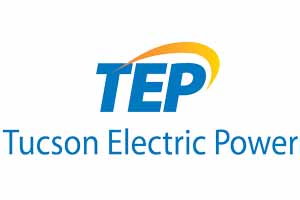The policies of the various Arizona electric utilities are very important to the implementation of Distributed Generation (solar electric, etc.) in Arizona.
The Solar Center will use this web space to describe the various utility policies.
 APS
APS
Effective September 1st 2017 APS implemented a new schedule of solar rates:
The days of residential net metering are now long gone, APS now uses meters that measure the instantaneous export power and APS credits this monthly at $0.1161 per kWh (for new PV systems with applications completed before August 31, 2019). APS On-Peak Energy Charges in the Summer range from $0.24314 down to $0.05750, depending on rate schedule and the corresponding demand charge. A simple summary is available at https://azsolarcenter.org/summary-of-residential-rate-plans-for-aps-customers-with-an-on-site-distributed-generation-system. It is difficult to determine an optimum rate selection. One factor to consider is that APS charges a monthly Grid Access fee of $0.93 per kWdc of the PV array rating. This adds up over the years and needs to be considered when deciding on an array rating. Eliminated, see link below.
There are residential PV system size limits: The PV array nameplate capacity cannot be larger than the following electrical service limits:
a) For 200 Amp service, a maximum of 15 kW-dc.
b) For 400 Amp service, a maximum of 30 kW-dc.
c) For 600 Amp service, a maximum of 45 kW-dc.
d) For 800 Amp service and above, a maximum of 60 kW-dc
For commercial systems APS offers net metering (Rate Rider EPR-6) and has a size limit that the facility’s nameplate capacity cannot be larger than 150% of the customer’s maximum one-hour peak demand measured in AC over the prior twelve (12) months.
Other APS specific information:
-
APS to eliminate the “grid access charge” for residential solar customers
- Summary of APS Solar Rate Plans- 2021
- APS- Residential Battery Pilot Program
- New: Understanding your APS Connected Photovoltaic System
 SRP
SRP
Residential solar customers are required to the use the E-27 rate schedule with its high demand rates, but low energy rates. Any monthly excess is credited at $0.037 to $0.0633 per kWh, much lower than APS. SRP does not have a monthly fee based on PV array or inverter size. If the PV system is over-sized, the excess energy is only worth $0.037 to $0.0633 per kWh.
For commercial PV systems SRP uses an hourly net metering procedure (BUYBACK SERVICE RIDER) in which any excess balance each hour is purchased by SRP at the Hourly Indexed Energy Price - $0.00017/kWh, basically the wholesale energy price at Palo Verde less a small handling charge. This averages $0.020 to $0.030 per kWh. This procedure makes it difficult to accurately forecast value of any excess credits.
Other SRP specific information:
- SRP is proposing three new Price Plans for Rooftop Solar
- SRP approves rate decrease as directors argue about solar power and batteries
TEP will pay new solar customers 8.68 cents per kilowatt hour (kWh) for their systems' excess power (note: this is not net metering), a price that reflects average market costs over a recent five-year period (TEP Statement of Charges as of October 1, 2019). Customers who file applications after Sept. 30, 2019 to install private rooftop solar systems will keep their initial export rate for up to 10 years. The export rate will be updated annually to reflect market prices for solar power, but will not be allowed to fall more than 10 percent. New solar customers also can choose from two existing Time-of-Use pricing plans, which offer lower rates during most of the day, on weekends and holidays. TEP offers Fast Track™ easy approval for simple PV systems of 10 kWac or less. See the current TEP rate schedule.
See also the TEP announcement Tucson Electric Power (TEP) to provide 70% of its energy from solar and wind by 2035
 Navopache Electric Cooperative
Navopache Electric Cooperative
Navopache Electric Cooperative is non-profit member-owned distribution cooperative, serving over 33,000 members across the White Mountains of eastern Arizona and western New Mexico. Navopache still (Feb 2019) offers Net Metering. Their basic policy is spelled out in their Net Metering Rate Schedule (link).
All their rate schedules are available (link).

 SULPHUR SPRINGS VALLEY ELECTRIC COOPERATIVE, INC.
SULPHUR SPRINGS VALLEY ELECTRIC COOPERATIVE, INC.
All kWh delivered by SSVEC to the Customer will be billed on the rate charged to the Customer under the applicable Standard Rate Schedule.
All kWh received from Customer (Customer produced excess energy) will be credited on a monthly basis by SSVEC to the Customer at the Distributed Generation Energy Export
(“DGEE”) Rate as defined below. Customer excess energy cannot be “banked,” “saved,” or “rolled forward” for use in a future month.There is no Annual True-Up month under this Schedule DG as the accounts are truedup monthly.
Distributed Generation Energy Export (DGEE) Rate shall be defined as follows:
Year 1 (2018) DGEE Rate $0.071165 per kWh
Year 2 (2019) DGEE Rate $0.064049 per kWh
Year 3 (2020) DGEE Rate $0.057644 per kWh
Year 4 (2021) DGEE Rate $0.051879 per kWh
Year 5 (2022) DGEE Rate $0.046691 per kWh
Year 6 (2023) DGEE Rate $0.041310 per kWh
Year 7 (2024 and beyond) DGEE Rate RCP Rate as updated annually.
Intro to arizonagoessolar.org website


